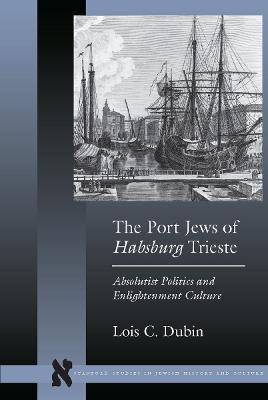The Port Jews of Habsburg Trieste: Absolutist Politics and Enlightenment Culture

The Port Jews of Habsburg Trieste: Absolutist Politics and Enlightenment Culture
This book offers an important new perspective on the process of Jewish integration in modern Europe. Heretofore, discussions of Jewish culture and politics in the eighteenth centry have emphasized enlightenment in Berlin and emphasized emancipation in Paris. In this study, the author addresses the Habsburg Mondarchy, which contained the largest Jewish Population in Europe outside Russia, by focusing on the free port of Trieste, at the crossroads of Central Europe, Italy, and the Levant. In this dynamic port city, mercantilist state-building, enlightenment absolutism, multicultural diversity, and Italian Jewish traditions produced a path toward integration that is generally ignored in modern Jewish history: that of acculturated merchants in commercial centers.
The book provides an in-depth study of enlightened absolutism in action--of the way rulers, officials, and subjects negotiated and implemented policies. It shows both maria Theresa and Joseph II as pragmatic state-builders who developed new policies of toleration for Jews and other religious minorities. The book also emphasizes the commitment by Trieste Jews to the new norms of acculturation, enlightenment, and civil inclusion--in contrast to the wariness expressed by other European Jews to enlighteneed absolutist programs of societal transformation.
The author seeks to counter the usual teleological readings of eighteenth-century Jewish history that sees civil-political improvement only in terms of the French Revolution's granting of legal emancipation. The example of Habsburg Trieste demonstrates the possibility and parameters of change within an Old Regime corporate-estates society and state, under which most Jews lived through the eighteenth and nineteenth centuries.
PRP: 343.58 Lei
Acesta este Pretul Recomandat de Producator. Pretul de vanzare al produsului este afisat mai jos.
309.22Lei
309.22Lei
343.58 LeiLivrare in 2-4 saptamani
Descrierea produsului
This book offers an important new perspective on the process of Jewish integration in modern Europe. Heretofore, discussions of Jewish culture and politics in the eighteenth centry have emphasized enlightenment in Berlin and emphasized emancipation in Paris. In this study, the author addresses the Habsburg Mondarchy, which contained the largest Jewish Population in Europe outside Russia, by focusing on the free port of Trieste, at the crossroads of Central Europe, Italy, and the Levant. In this dynamic port city, mercantilist state-building, enlightenment absolutism, multicultural diversity, and Italian Jewish traditions produced a path toward integration that is generally ignored in modern Jewish history: that of acculturated merchants in commercial centers.
The book provides an in-depth study of enlightened absolutism in action--of the way rulers, officials, and subjects negotiated and implemented policies. It shows both maria Theresa and Joseph II as pragmatic state-builders who developed new policies of toleration for Jews and other religious minorities. The book also emphasizes the commitment by Trieste Jews to the new norms of acculturation, enlightenment, and civil inclusion--in contrast to the wariness expressed by other European Jews to enlighteneed absolutist programs of societal transformation.
The author seeks to counter the usual teleological readings of eighteenth-century Jewish history that sees civil-political improvement only in terms of the French Revolution's granting of legal emancipation. The example of Habsburg Trieste demonstrates the possibility and parameters of change within an Old Regime corporate-estates society and state, under which most Jews lived through the eighteenth and nineteenth centuries.
Detaliile produsului








